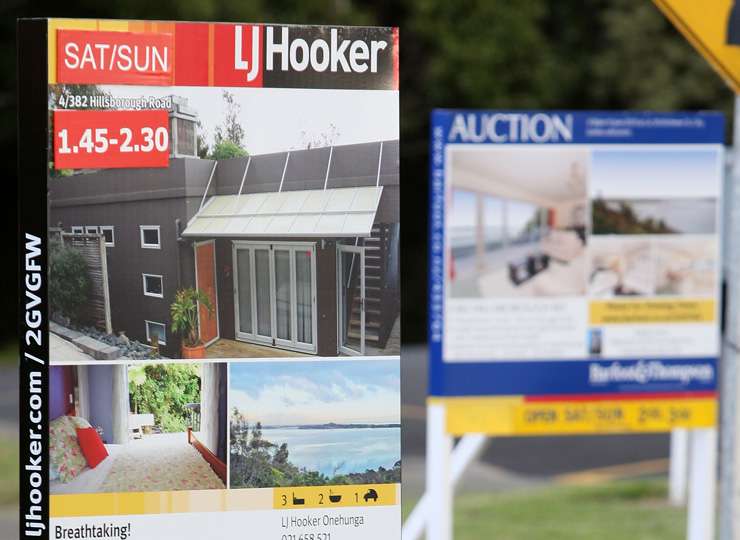House prices might be falling but experts say the declines so far don’t constitute a property crash.
Commentators OneRoof spoke to were hard-pressed to pinpoint the last proper crash in New Zealand, although the latest mortgagee sales figures could be an early sign of pain coming, says Nick Goodall, CoreLogic’s head of research.
One of the warning signs of a crash is an increase in the number of people who can’t afford their repayments who are forced into selling their homes.
While the country is hardly awash in mortgagee sales, the numbers have tripled this quarter compared to last quarter.
Start your property search
CoreLogic figures show as of April 1 there were 21 mortgagee sales, up from a low of just six for the previous quarter – and six was the lowest number recorded by CoreLogic since 2005.
“While the 21 is a decent jump up from six it's still very low in the longer-term context,” Goodall says, and he also points out some of the sales could be from recent construction industry liquidations.
Prior to 2020 every quarter had more mortgagee sales than now so the situation is by no means “panic stations”, Goodall says.
“We've also been tracking mortgage arrears data and there aren't any major signs yet that a large proportion of people are at risk of mortgagee sale but the change in trend suggests it's something to watch for as we move through this downturn in the market.”
Were the market to crash, that would depend on how far the market dropped overall and the rate of the drop, he says.
If the definition of a crash was six to 10 per cent on a quarterly basis, Goodall says you could argue parts of the market were already crashing.

CoreLogic head of research Nick Goodall: “There aren't any major signs yet that a large proportion of people are at risk of mortgagee sale.” Photo / Supplied
“The Hutt is certainly showing a drop of more than six per cent per quarter. You’d certainly say that’s a pretty significant adjustment for property prices in those areas.”
But there is no set definition of a crash in New Zealand, and nationally the price drops being seen are on the back of a boom phase.
“Whereas a crash, we might talk about more prices dropping below a sustainable level because they've truly got out of whack with affordability,” Goodall says.
He says for him a crash would involve a recession combined with job losses and if businesses stop hiring, start laying people off or start reducing employee hours, that could be a worrying sign.
“There are some potential things to watch for right now. We know inflationary pressures are forcing interest rates up which is forcing people to pay more on their mortgages which might mean they reduce their discretionary spend, which means less money to our businesses, which then means they have to adjust their financial situation as well.”
Goodall says you could argue there was a short crash during the Global Financial Crisis as prices dropped around 10 per cent over 17 months, and there was a significant lift in mortgagee sales over that time culminating in 777 in the third quarter of 2009, with 2618 for the whole of that year.
“People lost their jobs and they had to sell their property and take any price out there at a time where credit was hard to get because the banks were part of the problem back then.”
The situation now is very different, and despite the rise this quarter mortgagee sales are running at all time low levels since the GFC, he says.

Real estate signs in Auckland at the end of the GFC. Mortgagee sales hit a peak of 777 in the third quarter of 2009, as the GFC hit hard. Photo / Getty Images
“It peaked at 777 in Q3 of 2009 and then things gradually slowed back down again and they've essentially been dropping ever since. We’re running well below any period in the last 15 to 17 years.”
Independent economist Tony Alexander agrees widespread mortgagee sales would be the big warning signs of a crash, but we don’t have that.
“To have a crash you need panicked selling and there is no evidence of that in New Zealand. All we have is buyers going “yeah, nah” and standing back.”
Buyers are standing back for various reasons, such as not being able to get finance, higher interest rates, being wary of signing up for new builds because of stories about companies collapsing, or because prices simply got too high.
In fact, Alexander thinks the bulk of the mortgagee sales being seen will be in the property development sector.
“Too many over-capitalised, over-optimistic, inexperienced people have gone into that sector in the past two to three years and are getting burnt off now and over the next maybe two to three years as well.”
The housing market in New Zealand, and in most other countries, is just seeing a pullback from an unsustainable surge in prices over 2021, he says.

Independent economist Tony Alexander: “To have a crash you need panicked selling and there is no evidence of that.” Photo / Fiona Goodall
“If we have prices fall 20 per cent in New Zealand I still won't call that a crash because we simply saw this ridiculous surge in prices last year so to me it's definitely a correction.”
To find the last property crash in this country, Alexander says you would need to search into deep history.
He doesn’t think the GFC constitutes a property crash and says neither was there one in the late 1990s in the Dotcom era.
“Even around ’87, when interest rates were through the roof and the share market crashed by 60 per cent, house prices around New Zealand largely just flatted out around that time; they stopped rising for a while. Even in the 1970s when real house prices fell 40 per cent, it was stretched over a longer period of time,” Alexander says.
“In terms of a property crash one would have to go back in history and, who knows, you could end up back in the Great Depression, just something completely irrelevant to any modern analysis.”
Even if there was a crash, they tend to be relatively fast, he says.
“Generally, when markets fall they do it in a far more condensed period of time than the period of the upturn.”
Alexander thinks house price falls will be largely over by the end of this year.
Brad Olsen, a principal economist for Infometrics, says the ballpark numbers for him for a crash would probably be a 10 per cent drop in prices from peak to trough.
But even that is relative: “A 10 per cent crash from a 40 per cent soar, well, who cares?”
Olsen couldn’t think of a crash in recent times, saying in order to get back to affordability metrics of three times median income there would need to be around a 66 per cent fall in house prices which would shave off about two thirds of home owners values - and that would be a collapse, not a crash.
















































































